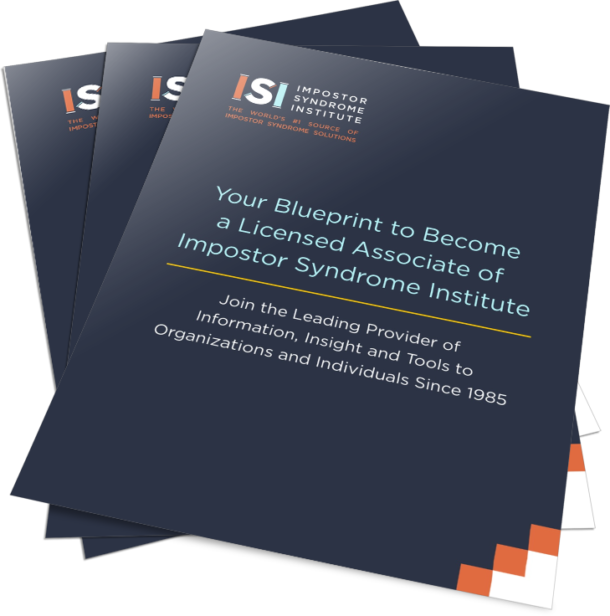In my more than three decades of speaking and leading workshops on Impostor Syndrome, my focus has always been to share how to overcome impostor syndrome.
I’ve spoken to an estimated 500,000 people and up until just a few years ago, I always ended my talks by giving audiences a list of ten ways to deal with impostor syndrome.
Audience evaluations were overwhelmingly positive. The one criticism? “I wish she’d given us more solutions.”
Or during the Q&A someone would come up to the mic and say, “This was great… but do you have any other solutions for how to deal with impostor syndrome?”
My response was always, “Of the 10 things I just gave you, what have you tried so far to overcome impostor syndrome?”
To which they’d invariably reply, “Well, nothing – I just wondered if there’s anything else we can do?”
I spent years thinking, “I just gave them TEN ways for how to overcome impostor syndrome! Is it them? Is it me? What am I missing?”
Then one day it hit me.
What people want is to walk into the room feeling like an impostor
and to walk out of the room not feeling like an impostor.
That’s not how it works. In fact, feelings are the last to change.
So now, before I even get to the solutions, I make sure my audience understands that people who don’t feel like impostors are no more intelligent or capable than the rest of us.
The only difference between them and us is that during that same situation that triggers an impostor feeling in us, they think different thoughts. That’s it, folks.
Which is really good news — because it means all we have to do is learn to think like a non-impostor.
And because impostor feelings are indeed the last to change, today I make sure everyone understands that…
The only way to stop feeling like an impostor is to stop thinking like an impostor.
Today I give my audiences three simple but non-negotiable strategies for how to overcome impostor syndrome. And they’re much happier.
(You can hear about them in a super short 6-minute TED impostor syndrome talk I gave at TED headquarters in New York.)
However, over the years people have asked about my original ten steps. So, here you go!
-
- Break the silence. Shame keeps a lot of people from “fessing up” about their fraudulent feelings. Knowing there’s a name for these feelings and that you are not alone can be tremendously freeing.
- Separate feelings from fact. There are times you’ll feel stupid. It happens to everyone from time to time. Realize that just because you may feel stupid, doesn’t mean you are.
- Recognize when you should feel fraudulent. A sense of belonging fosters confidence. If you’re the only or one of a few people in a meeting, classroom, field, or workplace who look or sound like you or are much older or younger, then it’s only natural you’d sometimes feel like you don’t totally fit in. Plus if you’re the first woman, people of color, or person with a disability to achieve something in your world, e.g. first VP, astronaut, judge, supervisor, firefighter, honoree, etc. there’s that added pressure to represent your entire group. Instead of taking your self-doubt as a sign of your ineptness, recognize that it might be a normal response to being on the receiving end of social stereotypes about competence and intelligence.
- Accentuate the positive. The good news is being a perfectionist means you care deeply about the quality of your work. The key is to continue to strive for excellence when it matters most, but don’t persevere over routine tasks and forgive yourself when the inevitable mistake happens.
- Develop a healthy response to failure and mistake making. Henry Ford once said, “Failure is only the opportunity to begin again more intelligently.” Instead of beating yourself up for falling short, do what players on the losing sports team do and glean the learning value from the loss and move on reminding yourself, “I’ll get ’em next time.”
- Right the rules. If you’ve been operating under misguided rules like, “I should always know the answer,” or “Never ask for help” start asserting your rights. Recognize that you have just as much right as the next person to be wrong, have an off-day, or ask for assistance.
- Develop a new script. Become consciously aware of the conversation going on in your head when you’re in a situation that triggers your Impostor feelings. This is your internal script. Then instead of thinking, “Wait till they find out I have no idea what I’m doing,” tell yourself “Everyone who starts something new feels off-base in the beginning. I may not know all the answers but I’m smart enough to find them out.” Instead of looking around the room and thinking, “Oh my God everyone here is brilliant…. and I’m not” go with “Wow, everyone here is brilliant – I’m really going to learn a lot!”
- Visualize success. Do what professional athletes do. Spend time beforehand picturing yourself making a successful presentation or calmly posing your question in class. It sure beats picturing impending disaster and will help with performance-related stress.
- Reward yourself. Break the cycle of continually seeking — and then dismissing — validation outside of yourself by learning to pat yourself on the back.
- Fake it ‘til you make it. Now and then we all have to fly by the seat of our pants. Instead of considering “winging it” as proof of your ineptness, learn to do what many high achievers do and view it as a skill. The point of the worn-out phrase, fake it til you make it, still stands: Don’t wait until you feel confident to start putting yourself out there. Courage comes from taking risks. Change your behavior first and allow your confidence to build.
You are welcome to reprint this post with the bio below.



